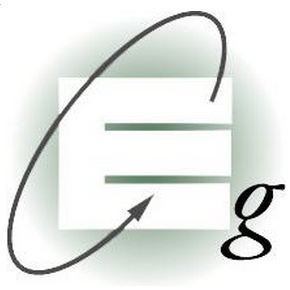Description
Environmental Consulting, Testing, and Remediation Services for Greater Chicagoland Environmental Consulting Group (ECG) is a Chicago-based environmental services firm that provides comprehensive environmental consulting, testing, and remediation services. ECG works with commercial, institutional, and public sector clients during projects of all types and sizes. We provide prompt service for sites located throughout Chicagoland and the greater Midwest. Environmental Consulting Group has over 18 years of experience assessing environmental problems and offering cost-effective solutions to clients. We look forward to learning more about your specific needs and discussing how we can help. Our services include: Phase I Environmental Site Assessments, Phase II Environmental Site Assessments, No Further Remediation Letters, Asbestos Inspections and Testing, Mold Assessments, Indoor Air Quality Testing, and more. Call us today! ------------------------------------------------ Why Choose Environmental Consulting Group? Fast Response and Timely Guidance Clients (and prospective clients) appreciate our proactive communication and rapid report delivery. For current clients and non-clients alike, we are available to discuss your environmental issue, and your options for dealing with it. For soil and groundwater contamination issues that may require remediation or a Phase II Environmental Site Assessment, ECG can often provide a free same day site visit. Common-Sense Environmental Solutions We rise above the fear factor and provide a rational approach and proportionate recommendations. Technical Expertise to Meet Your Environmental Services Needs ECG employs a highly qualified staff that is focused on meeting our clients’ needs. Our dedicated employees include environmental engineers, industrial hygienists, licensed asbestos inspectors & asbestos air sampling professionals, mold and lead-based paint inspectors, and more.
Reviews
Opening hours
Additional hours available by appt
Payment Options
Visa , MasterCard
Products And Services
-

Asbestos Services
Environmental Consulting Group, Inc. (ECG) has extensive experience in handling asbestos issues for our clients. From developing asbestos removal project designs to conducting asbestos training sessions, ECG’s experienced professionals respond quickly to our client’s needs. ECG’s asbestos consulting services include the following: Asbestos Material Inspections for Commercial Buildings, Institutions, Hospitals, Industrial Complexes, Warehouses and Residential Properties Asbestos Removal Project Design for Commercial Buildings Daily Monitoring of Asbestos Removal Projects Development of Operations and Maintenance Programs 2-hour Asbestos Awareness Training Sessions 16-hour Asbestos Awareness Training Sessions Air Testing by Phase Contrast Microscopy (PCM) or by Transmission Electron Microscopy (TEM) Asbestos Removal and Cost Estimates
Link: Asbestos Services
-
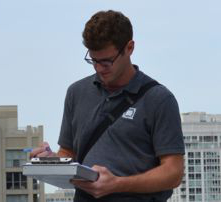
Phase I Environmental Site Assessments
Phase I Environmental Site Assessments Phase I Environmental Site Assessments (Phase I ESAs) are often required when commercial and industrial properties are sold, re-developed, or re-financed. During these transactions, Phase I Site Assessments are an important part of the “due diligence” process as they help lenders and property purchasers to minimize their environmental liabilities. A high-quality Phase I ESA can facilitate re-financing of a property, prevent delays in site re-development projects, and save purchasers thousands of dollars by ensuring costly site remediation work isn’t necessary. To meet your unique Phase I Environmental Site Assessment needs, we offer: Expedited Site Inspection and Report Delivery Competitive Pricing Experienced, ASTM-Approved Environmental Professionals Lender, ASTM, and IHDA-Approved Phase I Reports Free Reliance Letters
-

Phase II Environmental Site Assessments
Phase II Environmental Site Assessments In general, a Phase II Environmental Site Assessment (Phase II ESA) addresses the Recognized Environmental Conditions identified in a Phase I ESA. ECG offers: No Obligation On-Site Consultations Free Phase I ESA Report Review Competitive Pricing Fast Report Turnaround ECG can provide Phase II ESA services regardless of whether we completed your Phase I ESA. In addition, we can review other environmental reports to help you understand the environmental issues associated with the property. To obtain more information about Phase II Environmental Site Assessments, contact ECG.
-

Contaminated Soil Removal
The most straight-forward method of soil remediation is to remove contaminated soils from the site. This approach is often recommended when the volume of impacted soil is relatively small or when contamination is only present within near-surface soils. The steps associated with soil removal include: Testing the soil for landfill approval Staking out the removal area Identifying and marking on-site utilities Excavating the contaminated soil Loading the soil into a dump truck Collecting confirmation soil samples from the excavations Sending the samples to a laboratory for analysis Evaluating the sample results to approve backfilling the excavation If any confirmation soil sample exceeds the cleanup objectives, then additional soil removal and additional confirmation soil testing is required. Backfilling the excavation
-
No Further Remediation Letters (NFR Letters)
No Further Remediation Letters (NFR Letters) When soil and/or groundwater concentrations exceed the corrective action objectives, in most cases, owners want to obtain a No Further Remediation (NFR) letter from the Illinois Environmental Protection Agency.The NFR Letter signifies a release from further responsibilities in performing remedial action and is considered prima facie evidence that the site does not constitute a threat to human health or the environment. The NFR letter is filed with the Office of the Recorder or the Registrar of Titles of the county in which the remediation site is located so that it forms a permanent part of the chain of title and, thereby, notifies future owners of the terms of the NFR letter. In many cases, property owners can obtain an NFR letter without conducting actual remediation. For example, engineered barriers can be installed over the contaminated soils in order to prevent exposure. Engineered barriers include: Caps constructed of concrete, asphalt, compacted clay, or other approved material Permanent structures such as buildings and parking lots Three to ten feet of clean soil In order to obtain an NFR letter, the Illinois EPA requires many steps and forms, but the main steps include completing the following reports: Focused Site Investigation Report; Remediation Objectives Report; Remedial Action Plan; and, Remedial Action Completion Report. These reports are required even if no remediation is conducted. Within 60 days, the Illinois EPA reviews each of the above plans and reports. The program is completely voluntary, and the remedial applicant (the client) can withdraw at any time without penalty.
-
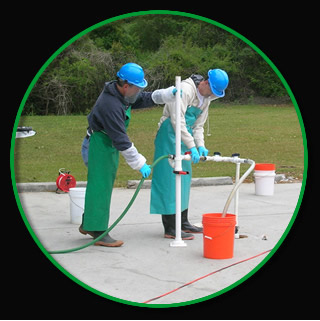
Non-Destructive Remediation
Remediation of soil and groundwater can now be accomplished with little disruption to a contaminated site. This type of “in-situ” remediation is commonly done and there is no removal of the soil or groundwater. ECG utilizes in situ chemical oxidation (ISCO) to reduce the concentrations of targeted environmental contaminants to acceptable levels. ISCO is an advanced oxidation technology where remediation is accomplished by injecting or otherwise introducing strong chemical oxidizers directly into the contaminated medium (soil or groundwater) to destroy chemical contaminants in place. In general, soil testing is performed approximately one month following the injection in order to determine the effectiveness of the application. Pending the analytical results of the soil samples, additional injections of the chemical oxidizers may be required. When confirmation samples contain acceptable contaminant concentrations, injection activities cease.
-
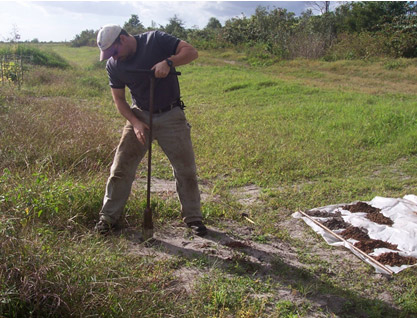
Soil and Groundwater Testing
Soil and groundwater testing is often performed as part of a Phase II Environmental Site Assessment (ESA). For example, if an underground gasoline storage tank was discovered during the Phase I ESA, ECG may design a soil and groundwater testing project that involves installing soil borings around the underground tank. Soil samples would be collected and analyzed for gasoline indicator contaminants, such as benzene, to determine whether the soil surrounding the tank is contaminated. The scope of work for a Phase II ESA, or subsurface investigation, involving both soil and groundwater testing might include: A site visit to layout the boring locations and groundwater monitoring well locations. Advancing soil borings in selected areas of the site. The soil borings would be drilled to a depth of approximately 16 feet below grade surface. Collecting soil samples for field screening, and selecting soil samples for laboratory analysis. Analyzing soil samples for volatile organic compounds (VOCs), benzene/toluene/ethylbenzene/xylenes (BTEX), methyl tertiary butyl ether (MTBE), semi volatile organic compounds (SVOCs), polynuclear aromatics (PNAs), total metals (metals), pH, and dry weight. Installing groundwater monitoring wells to depths of approximately 20 feet. Developing and surveying the wells. Collecting five groundwater samples and having them analyzed for VOCs and SVOCs. Completing a Phase II ESA or a Subsurface Investigation Report summarizing the field activities and analytical work. ECG has extensive experience with all aspects of soil and groundwater testing. We conduct subsurface investigations regardless of whether we conducted the Phase I ESA or any other environmental work on the property. To receive a quote for testing services, contact an ECG representative at 312.663.3900.
-
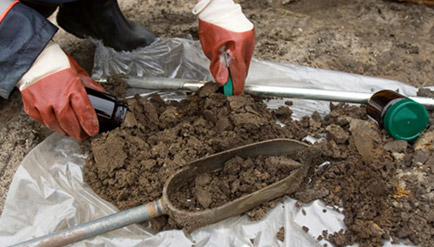
CCDD Testing
(Clean Construction or Demolition Debris Testing) As defined by the Illinois EPA: Clean construction or demolition debris (CCDD) is uncontaminated broken concrete without protruding metal bars, bricks, rock, stone, or reclaimed asphalt pavement generated from construction or demolition activities. The State of Illinois has implemented a new regulation that controls uncontaminated soil from construction or demolition projects. Before a “clean fill site” (landfill) can accept this waste, they must first obtain certification from a licensed Professional Engineer that the soil is uncontaminated. Environmental Consulting Group can provide this certification for sites located throughout Chicagoland. As part of our CCDD soil testing services, we will: Visit the site and collect a soil sample Determine the analysis required (based on the site history) Submit the sample to a qualified laboratory Evaluate the laboratory results Complete the necessary forms with a professional engineer certification After ECG’s work is complete, the contractor then takes the certification to the clean fill site (landfill) to obtain approval for disposal. Once the contractor has obtained this approval, they can transport their material to the clean fill site. To speak with an ECG project manager about our CCDD testing services, call us at (312) 663-3900.
Link: CCDD Testing
-

Soil Characterization for Landfill Disposal
For contaminated sites, owners must test the soil for waste characteristics prior to proper disposal. The results of the testing are submitted to a special waste landfill. ECG’s services include: Visiting the site to collect soil samples. Submitting the samples with a completed chain of custody to an accredited laboratory. The laboratory analyzes the samples for the parameters listed in 35 Illinois Administrative Code 740, Appendix A: Target Compound List, or for other parameters as specified by the landfill. Completing a report summarizing the field activities, including the soil sampling procedures, and a table summarizing the analytical data. ECG can conduct waste characterization testing for your project. To receive a quote for testing services, contact an ECG project manager at 312.663.3900.
-

NPDES
(National Pollutant Discharge Elimination System) NPDES is a federal permit program used to regulate wastewater discharges to Illinois streams and lakes. They provide facility owners with a discharge-specific set of conditions under which discharges may occur and establish monitoring and reporting requirements. Environmental Consulting Group, Inc. can conduct testing of your discharge. Typically, the work involves the following steps: Visiting the site to collect water samples using clean disposable polyethylene bailers and laboratory-provided glassware appropriate for the specified analysis. Submitting the samples to an accredited laboratory for analysis. The results are compared to Title 35 Ill. Adm. Code (IAC), Section 304, Subpart A: General Effluent Standards (GES). The GES are the basis for the NPDES discharge standards. Completing a report that summarizes ECG’s field activities and the analytical results for all sampled materials.
Link: NPDES
-
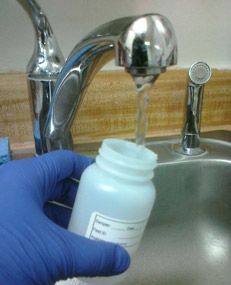
Drinking Water Testing
National Primary Drinking Water Regulations (NPDWRs or primary standards) are legally enforceable standards that apply to public water systems. Primary standards protect drinking water quality by limiting the levels of specific contaminants that can adversely affect public health and are known or anticipated to occur in public water systems. The Environmental Protection Agency sets standards that, when combined with protecting ground water and surface water, are critical to ensuring safe drinking water. Legionella, Total Coliform, and Priority Metals Water Testing A variety of potential contaminants can be assessed by water testing, including: Legionella Bacteria (Associated with Legionnaires’ Disease) Total Coliform 13 Priority Metals Contact us at 312.663.3900 to receive a quote for drinking water and non-potable water testing services.
Link: Drinking Water Testing
-

MWRD RD920 Water Testing
The Metropolitan Water Reclamation District of Greater Chicago requires that requires that property owners accurately monitor the wastewater discharge volumes and determine the representative concentrations of Biochemical Oxygen Demand (BOD) and Suspended Solids (SS). This sampling data must be reported on the User Charge Certified Sampling Analysis Reporting Statement (RD-920). Users must submit with this statement, along with specific and detailed laboratory analysis reports, sampling logs, logs of flow-meter readings, calibration certification, etc., signed by their consulting engineers To receive a quote for RD920 testing services, contact an ECG representative at 312.663.3900.
Link: MWRD RD920 Water Testing
-
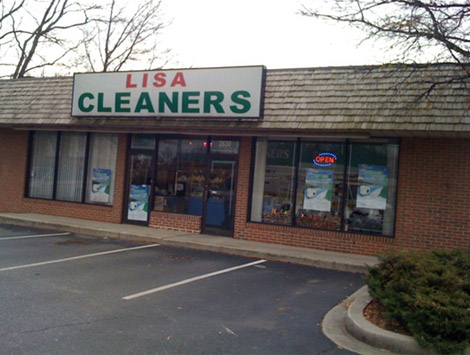
Environmental Services for Dry Cleaners
Approximately 85% of cleaners use perchloroethylene, perc, as their primary solvent. Perc can enter the ground in liquid form through spills, leaky pipes, leaky tanks, machine leaks, and from improperly handled waste. ECG conducts environmental investigations of dry cleaning facilities. In the event contamination is found, ECG can provide remediation services. Remediation can now be accomplished with little disruption of a site. This “in-situ” remediation is commonly done and there is no removal of the soil or groundwater. In some cases, the Illinois Drycleaner Environmental Response Trust Fund can provide financial resources to pay for the cleanup of spills and/or leaks from drycleaning establishments. Contact ECG for a free, no obligation review of your site at 312.663.3900.
-
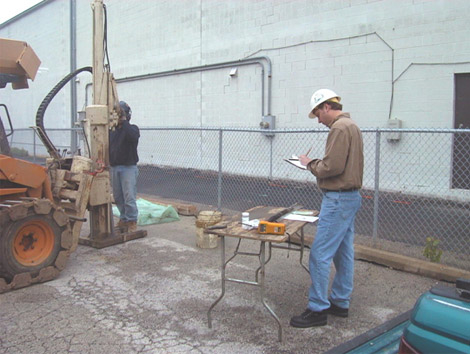
Drycleaner Investigation/Remediation
Most drycleaning facilities use chlorinated solvents or perchloroethylene (PCE) as the primary cleaning chemical. Releases of PCE can occur as the result of equipment failure, spills and leaks. Even minor spills or leaks can result in significant quantities of PCE being released to the underlying soil and groundwater over time. Most environmental investigations of dry cleaning facilities include soil borings, with the collection of soil samples, from locations as close to the dry cleaning machines as possible. Contact ECG for a free, no obligation review of your site at 312.663.3900
-
Illinois Dry Cleaner Fund
he Illinois Drycleaner Environmental Response Trust Fund was established in response to requests by operators of retail drycleaning facilities to have financial resources available to pay for the cleanup of spills and/or leaks from their drycleaning establishments. The Fund consists of three primary programs: a licensing program, an insurance program and a remedial program. The licensing program is mandatory for all retail drycleaning facilities in Illinois. The annual license fee ranges from $1,500 to $5,000, based upon the amount of drycleaning solvent purchased at the drycleaning facility. The insurance program provides up to $500,000 in pollution liability insurance to pay for the cleanup of soil and groundwater contamination caused by a future spill or leak of dry cleaning solvent at the insured’s facilities. A $10,000 deductible applies to each incident.
-
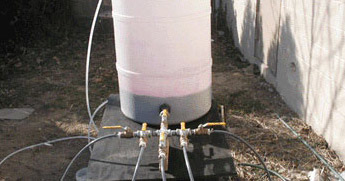
Non-Destructive Remediation for Dry Cleaners
Remediation of soil and groundwater contaminated with dry cleaning solvents can be accomplished with little disruption of a site. This “in-situ” remediation is commonly done and there is no removal of the soil or groundwater. A situ chemical oxidation (ISCO) process is used to reduce the soil concentrations of dry cleaning solvents to acceptable levels. ISCO is an advanced oxidation technology where remediation is accomplished by injecting or otherwise introducing strong chemical oxidizers directly into the contaminated medium (soil or groundwater) to destroy chemical contaminants in place. In general, soil testing is performed approximately one month following the injection in order to determine the effectiveness of the application. Pending the analytical results of the soil samples, additional injections of the chemical oxidizers may be required. When confirmation samples contain contaminant concentrations that are acceptable, then injection activities cease.
-
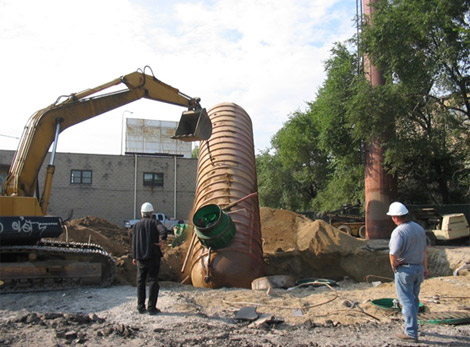
Underground Storage Tanks
ECG has the experience and knowledge necessary to handle all aspects of underground storage tank (UST) removal and closure. Our staff has extensive knowledge of applicable state and federal UST regulations and uses that information to help site owners decide whether to remove an underground tank, conduct remediation, or keep the UST in place. When a site owner decides to remove the UST, ECG ensures that the work is conducted in a streamlined and cost effective manner. ECG also has experience working with the Illinois EPA reimbursement program for underground tank sites. For example, when gas stations remove their underground gasoline storage tanks and soil contamination is found surrounding the tank, certain sites may be eligible for reimbursement of their environmental costs. Contact ECG for a free, no obligation review of your site at 312.663.3900
-
No Further Remediation (NFR) Letters
When soil and/or groundwater concentrations surrounding an underground storage tank exceed the corrective action objectives, in most cases, owners want to obtain a No Further Remediation (NFR) letter from the Illinois Environmental Protection Agency. The NFR letter signifies a release from further responsibilities in performing remedial action and is considered prima facie evidence that the site does not constitute a threat to human health or the environment. The NFR letter is filed with the Office of the Recorder or the Registrar of Titles of the county in which the remediation site is located so that it forms a permanent part of the chain of title and, thereby, notifies future owners of the terms of the NFR letter.
-
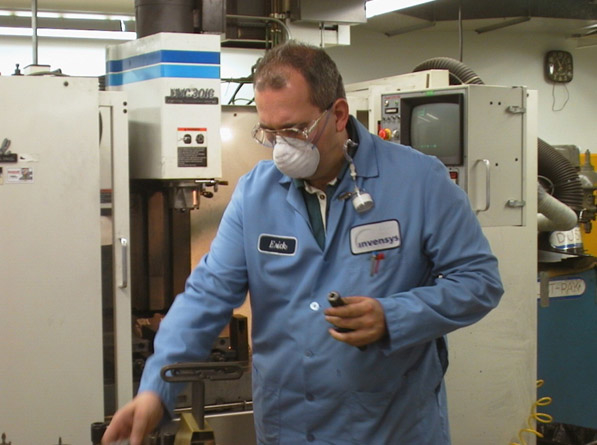
Industrial Hygiene Services
ECG provides industrial hygiene services to companies that want to ensure the safety and well-being of their most important asset – their employees. ECG can conduct an industrial hygiene assessment at your facility that will proactively assess the exposure of your workforce and confidentially evaluate your company’s level of compliance with OSHA regulations. ECG’s approach is designed to minimize our client’s liabilities and reduce the likelihood of claims related to work place injury and illness. ECG maintains a staff of industrial hygiene professionals who are knowledgeable in the management, evaluation, and development of: Industrial hygiene surveys for chemical exposure, noise, and radiation Sampling for airborne contaminants Personal exposure monitoring Hazardous process review Hazard communication Other industrial hygiene services For more information about our industrial hygiene services, contact ECG at 312.663.3900.
-
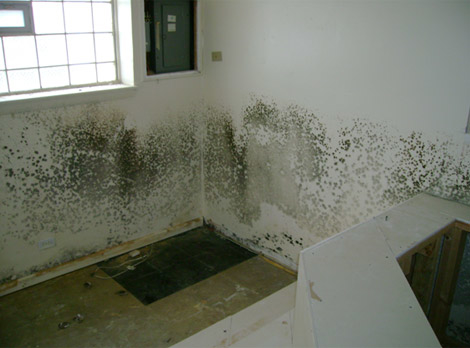
Mold assessments
Link: Mold assessments
-
Mold Abatement
Link: Mold Abatement
-
Airborne and material mold testing
-
Mold removal project design for commercial buildings
-
Daily monitoring of mold removal projects
-
2-hour mold awareness training sessions
-
Mold sample analysis
Link: Mold sample analysis
-
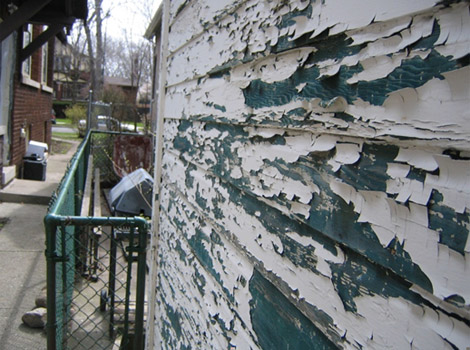
Lead Services
ECG provides a variety of professional environmental services related to lead contamination: Lead-based paint testing is conducted to determine the presence and location of lead-containing paint within a particular facility. Testing water from your drinking water outlets is important. While public water supplies may meet all public health standards for lead, elevated concentrations may exist due to lead-contaminated plumbing components in your facility. Airborne lead testing is conducted to ensure that lead levels in the work area meet Occupational Safety and Health Administration (OSHA) standards. For all lead projects, ECG utilizes Illinois Department of Public Health (IDPH)-licensed lead inspectors and lead risk assessors. We have conducted hundreds of Section 8 lead-based paint inspections and lead-wipe clearance tests in full compliance with HUD regulations. We have also conducted hundreds of lead-based paint inspections utilizing ECG’s x-ray fluorescence (XRF) instrument in compliance with HUD regulations.
Link: Lead Services
-
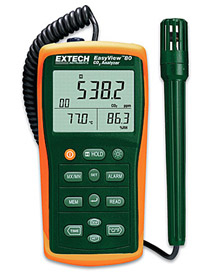
Asbestos
Link: Asbestos
-
Carbon monoxide
Link: Carbon monoxide
-
Carbon dioxide
Link: Carbon dioxide
-
Sulfur dioxide
Link: Sulfur dioxide
-
Nitrogen dioxide
Link: Nitrogen dioxide
-
Volatile Organic Compounds
-
Formaldehyde
Link: Formaldehyde
-
Particulates
Link: Particulates
-
Temperature
Link: Temperature
-
Relative humidity
Link: Relative humidity
-

Full Inspections
ECG’s environmental health inspection services are focused on food safety issues such as food handling, food storage, indications of pest infestation, and verifying food service sanitation training certification. After each inspection, a written report is issued utilizing a three-part carbonless form. The report will include the results of the inspection and a detailed description of all food service sanitation violations.
Link: Full Inspections
-
Re-inspections
Re-inspections are conducted in the event of a critical violation or a repeat violation. The re-inspections focus on any violations, and continue until the critical and/or repeat violations have been corrected.
Link: Re-inspections
-
Other Services
Reviewing plans for proposed new restaurant and/or kitchen construction Consulting services associated with vector control Training for IDPH Food Service Sanitation Re-certifications Training food service workers and vendors for special events such as outdoor fairs, farmer’s markets, etc. Consulting services for West Nile virus outbreaks For more information about our food safety services, contact ECG at 312.663.3900.
Link: Other Services
-
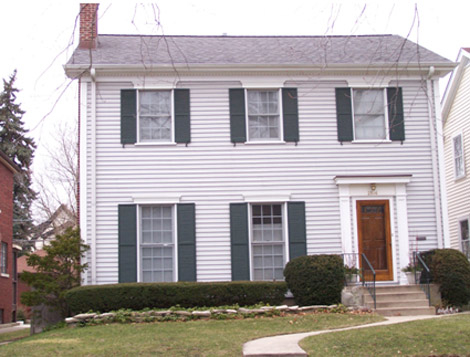
Residential Services
When you work with ECG, you will benefit from: Impressive Responsiveness We are organized to respond quickly to your inquiries and can often have a technician at your home within 24 hours. Value ECG’s prices are very competitive and you can expect highly trained, professional technicians to address your concerns every step of the way. State of the Art Equipment Unlike some firms, our experienced technicians utilize high-tech equipment such as infrared cameras, thermal imagers, and video boroscopes in our residential work. This combination of experience and equipment helps us identify issues very quickly, accurately, and without damage to your home.
Link: Residential Services
Categories
Environmental Consulting(312)663-3900 (312)-663-3900 +13126633900 (800)282-2084 (800)-282-2084 +18002822084
Map 411 South Wells Street
Loading map...
